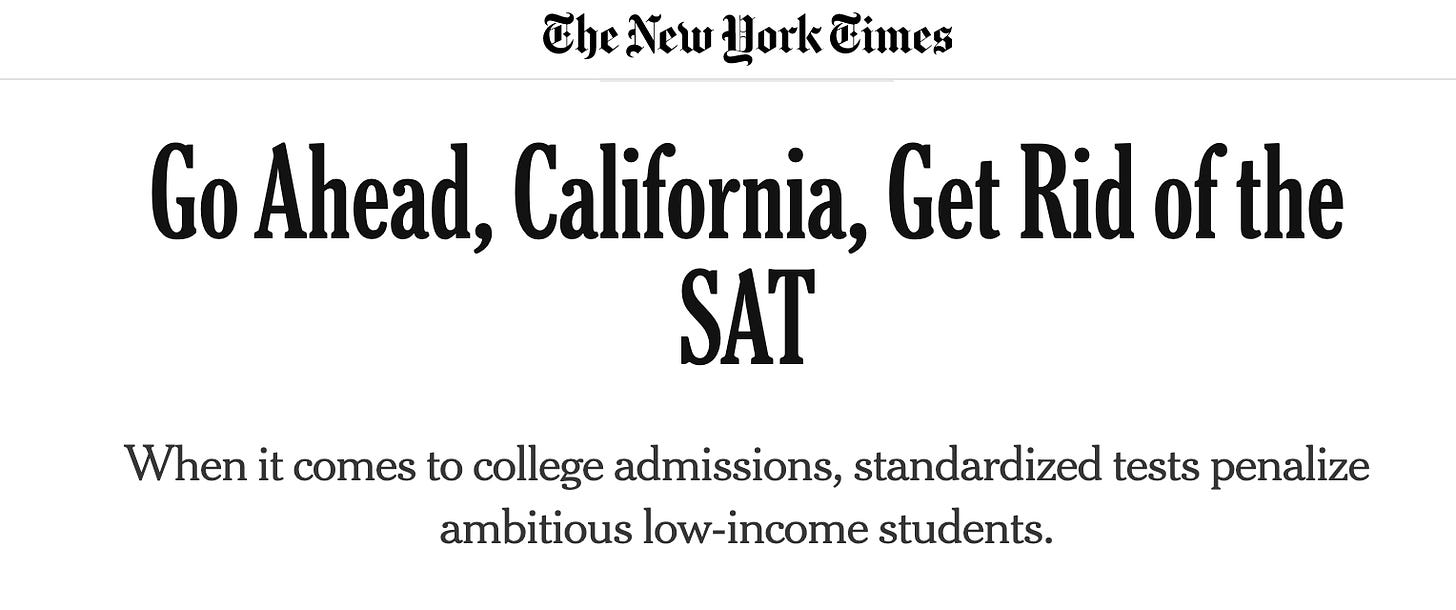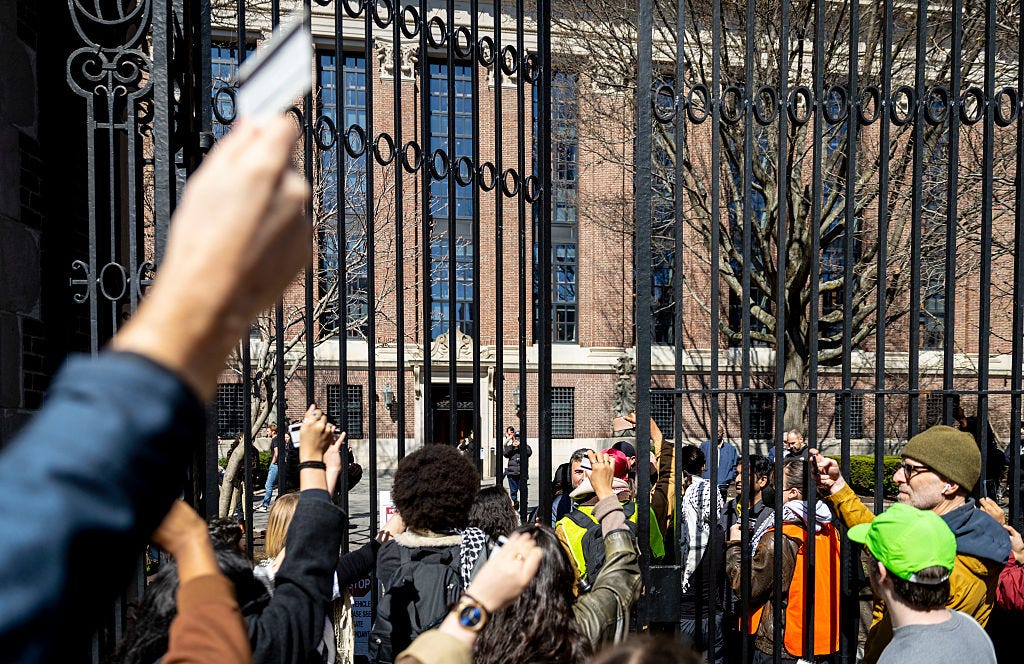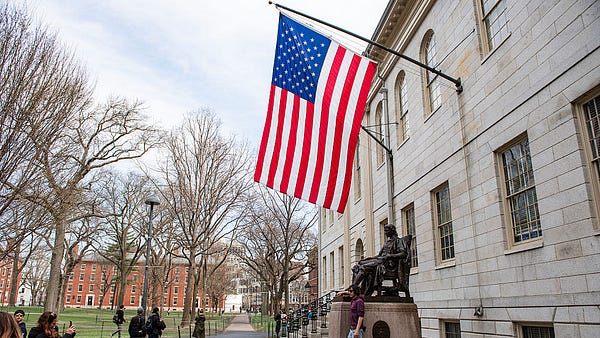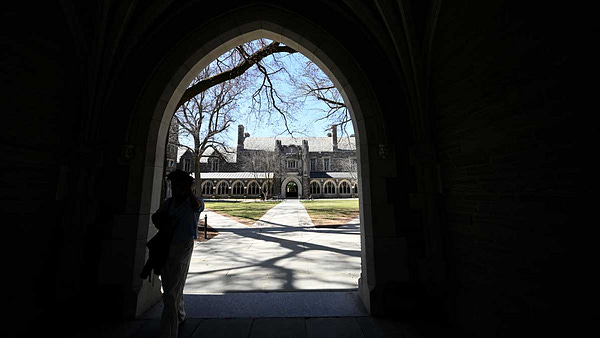
The Free Press

Suppose you’re a poor teenager in a dysfunctional environment.
You have to work a part-time job to help make ends meet. Your parents are absent or completely checked out. So you have to help take care of your younger siblings. You’re smart, but you’re not in a position to devote much time to homework or to getting top grades in every class. But you set a few hours aside in an afternoon, and receive an outstanding score on the SAT. Suddenly, options become available to you.
Our ruling class is doing all they can to prevent this possibility.
Remember:
If you come from poverty and chaos, you are up against three enemies:
1. Dysfunction and deprivation
2. Yourself, as a result of what that environment does to you
3. The luxury belief class, who wants to keep you mired in it
Columbia University has just become the first Ivy League school to permanently abandon the SAT/ACT requirement for college admission.
Elite colleges are eliminating standardized tests before they eliminate legacy admissions. Tells you all you need to know.
The reasoning, according to Columbia’s announcement, is “to best determine an applicant’s suitability for admission and ability to thrive in our curriculum and our community, and to advance access to our educational opportunities.”
The ability to effortlessly produce buzzwords and gibberish and euphemisms has become a precondition for advancement in our institutions of higher learning, which is how ambitious mediocrities have gained control.
I know it’s supposedly “test optional.” But this contributes to a situation in which testing is downgraded and other application materials take on even more importance.
Here’s a headline in The New York Times:
The writer claims standardized tests penalize poor kids who get good grades. He calls it a “barrier.”
I rarely see discussions about the reverse situation. There are poor kids who get bad grades but find a path upward because of standardized testing.
A 2016 study found that implementing a standardized testing requirement increased the number of poor and non-white kids in gifted programs. In other words, an IQ test administered to all students revealed that previously overlooked students from disadvantaged backgrounds qualified as academically gifted.
Similarly, a British study found that when relying on their own impressions, teachers tended to view a kid from a low-income background as less academically competent even when they had the same test score as a rich kid. The objectivity of scores can serve as a useful corrective to the subjective nature of teacher evaluations.
I graduated in the bottom third of my high school class with a 2.2 GPA. Didn’t think of myself as “smart.” I thought a lot and read a lot. But I hated homework, teachers, rules, etc. I thought “smart” meant kids who did their homework and raised their hand in class. Those types.
My senior year of high school I took the required test to join the military—the Armed Services Vocational Aptitude Battery (ASVAB). Half my motivation to take this test was because I got to skip class. I spent the night before the test with my friends drinking Four Loko and playing Fight Night Round 3 on Xbox 360. Woke up with a hangover, chugged 20 ounces of Rockstar energy drink, and took the test. Afterward, the Air Force recruiter showed me how to convert ASVAB to SAT scores. I got the same score as my smartest friend who always got straight As and was headed for college. What the fuck? I thought.
At the time, I wasn’t aware these tests are thinly veiled IQ tests. The SAT, ASVAB, and the ACT are all highly correlated with IQ.
A study on Army recruits found that scores on an intelligence test, along with two-mile run time, were the best predictors of success in infantry training.
Research on tank gunners found that replacing a gunner who scores around the twentieth percentile with one who scores around the fifty-fifth percentile improves the likelihood of hitting a target by 34 percent.
To qualify, potential military recruits must score higher than roughly one-third of all who take the ASVAB. The lowest acceptable percentile score to join is 36 for the Air Force, 35 for the Navy, 31 for the Marine Corps, and 31 for the Army. By definition, the worst test-taker who makes it into the military still scores higher than one-third of his or her peers. The military slices off the bottom third of standardized test-takers, not allowing them to join.
The psychologist and intelligence researcher Linda Gottfredson has written:
IQ 85. . . the U.S. military sets its minimum enlistment standards at about this level. . . . The U.S. military has twice experimented with recruiting men of IQ 80-85 (the first time on purpose and the second time by accident), but both times it found that such men could not master soldiering well enough to justify their costs.
In the 1960s, Secretary of Defense Robert McNamara launched Project 100,000, which lowered the testing requirement for armed services entry. This allowed people at the tenth percentile (80~ IQ)—a standard deviation lower than the previous standard—to join.
Supposedly, the aim was to alleviate poverty. LBJ had recently begun his War on Poverty program. The story was that getting more recruits into the military would help them move into the middle class. And they needed more recruits for the Vietnam War. Lowering recruitment standards was an easy way to get them.
Recruits of Project 100,000 were nine times more likely to require remedial training and training took up to four times longer to complete compared to their peers who had entered under the higher score requirement. In Vietnam, men recruited under the lower testing threshold were 2.5 times more likely to die in combat.
Did the veterans who made it home achieve upward mobility? No. Compared to civilians with similar attributes who were not recruited, McNamara’s Morons (as they were later termed) were less likely to be employed, less likely to own a business, and obtained less education. Later, the policy changed to improve the talent pool of the armed forces. Higher ASVAB score thresholds were reinstated along with additional rigid requirements.
Today, eight out of ten Americans between ages 17 and 24 are ineligible for military service, mostly due to obesity, medical issues, and criminal records.
Anyway, seeing my ASVAB score was the first time I learned I could have been a good student. It was possible. How many kids out there are like this? Kids who have fucked-up lives and get bad grades that mask their underlying potential, potential that a standardized test could reveal?
The SAT is a “barrier,” according to that NYT op-ed. But it’s also a gateway. Most poor kids don’t take the SAT or any other standardized test. More should.
Standardized testing should be freely available and compulsory for all high school students.
The chattering class is using poor kids as pawns to eliminate standardized testing, which helps their own kids—rich kids who “don’t test well.” But they know how to strategically boost their GPAs, get recommendation letters from important people, stack their résumés with extracurriculars, and use the right slogans in their admissions essays. They have “polish.”
Applicants from the most affluent families excel at these games. A study at Stanford found that family income is more highly correlated with admissions essay content than with SAT scores. Applicants from well-to-do backgrounds are especially adept at crafting their essays in ways that please admissions committees.
Interestingly, despite the chatter about getting rid of the SAT and the GRE, there is no talk of eliminating the ASVAB military test. No one says that it’s biased, unreliable, or discriminatory.
There are two reasons for this.
1. In the military, actions have real consequences. People want service members to be held to a high standard. For military recruits, a pencil and paper test is a reasonable requirement. But for those interested in studying at a place of higher learning, it’s a bridge too far.
2. The military is viewed as a lower middle class organization. Influential members of society know their kids won’t be joining. So they don’t care about military entry standards the way they do for college and grad school.
Rob Henderson coined the term “luxury belief.” He’s an Air Force veteran and has a PhD in psychology. This article appeared recently on Rob’s Substack and an expanded version was first published in Persuasion.
And if you believe in independent journalism, become a Free Press subscriber today:















I was never good at testing, period. I got my schooling in India and studying meant memorizing text books and regurgitating in tests. I was easily distracted never could read end to end once let alone multiple times like the "smart" ones did. I'm 44, back then things were not as nuanced as they are today. There's a better recognition of different abilities. I would've thrived in an environment if someone had tried to teach me a concept, i loved to understand how things worked, instead of requiring me to memorize it.
The point I'm trying to make is we are at a point in time where we have the tools to recognize ones abilities. Instead of eliminating one type of testing why not invent ways to test ones strengths where they lie. Some squares will never fit through a circle. That, in my humble opinion, would be true equality.
Respectfully, I disagree. Test-optional policies are a smokescreen: they let colleges look woke while still doing whatever they want. And what do they do? The best evidence we have on test-optional colleges indicates that they let in score-submitters at higher rates than non-score-submitters.
There are probably a number of reasons for that:
1. Non-score-submitters probably tend to have lower scores and be less smart and so stood lower chances of admissions anyway
2. Colleges probably assume point 1 about non-score-submitters, even if it isn't true
3. Colleges have less information about non-score-submitters. They don't want to make risky bets on such kids, who might wash out and pull down their four- and six-year graduation stats, which are important in the US News rankings
For more clear-eyed, empirical, and actionable takes on college admissions, read Clarke College Insight! :)